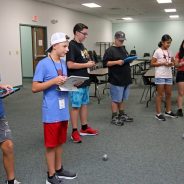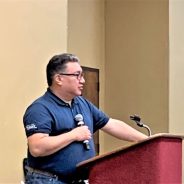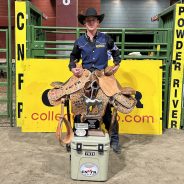Chamber Connection – June 26, 2024
By Butch Burney
Join us for our main networking monthly event when Nations Lending hosts our Cocktails and Conversation on Thursday, June 18.
You don’t have to be a Chamber member to attend. It is free to everyone, and a prime time to make friends and contacts.
The event will also mark the grand opening for Bethany Ashby’s new Nations Lending office, located at 425 Main St.
Stew is in the Air
It’s too hot for stew in June, but it’s not too early to begin thinking about the stew contest.
Stew cooks and sponsors, be looking for registration and sponsorship forms to be distributed in the next couple of weeks. This year’s theme for the 55th Annual Hopkins County Stew Contest on Oct. 26 is Stewper Heroes.
The registration cost will remain at $100 per stew site.
Willy Wonka
The Community Players will present Willy Wonka Jr., a musical, later this month at Main Street Theatre. Production times are June 21, 22 and 28 at 7 p.m., and June 23, 29 and 30 at 2 p.m.
Go to CommunityPlayersInc.com for more more information.
Independence Day Concert
The 32nd annual Independence Day Concert and Fireworks on the downtown square is set for Saturday, June 29, with the concert starting at 8 p.m.
The Northeast Texas Symphony Orchestra, conducted by Dr. Douglas Bakenhus, will perform classic favorites.
Back to School Fair
CANHelp in Sulphur Springs is gearing up to host their annual Back-to-School Fair, which assists children in low-to-moderate income families prepare for the new school year, by providing school supplies, haircuts and other needs. The fair is on August 1, but pre-registration is required for students to receive school supplies.
You can pick up an application at CANHelp (613 Gilmer Street).
Businesses may also register to participate as a vendor
Ribbon Cutting
There will be a ribbon cutting for Rowdy Goose Parties and More at 3 p.m. Thursday, June 27, at Buford Park. There will be bounce houses for kids and more! Everyone is invited to the event.

PJC Offering Free Robotics Coding Camp For Area Middle School Students
June 26, 2024 – Paris Junior College is offering six free, week-long Robotics Coding Camps that take an interactive approach to designing and coding robots through coding and use of Sphero BOLT and VEX V5 robots. Campers will be presented challenging and innovative concepts in learning, problem solving and analytical skills while fostering an interest in computer coding/programming.
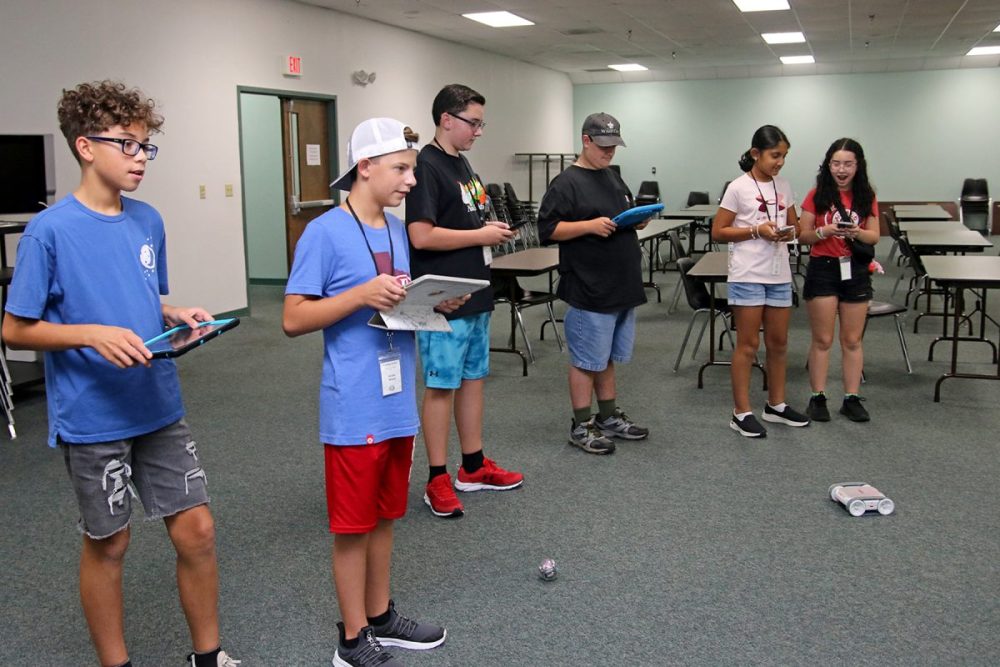
Each one-week, no-cost day camp is for students entering the sixth, seventh, or eighth grade in the 2024-2025 school year or who have completed eighth grade in 2024. The camps will rotate among PJC locations in Paris, Greenville and Sulphur Springs. The first registration deadline is July 2 for the PJC-Sulphur Springs Center camp that begins July 8.
Prioritization of enrollment will be for foster youth, students with disabilities, students from low-income families, and students from populations underserved in Science, Technology, Engineering and Mathematics (STEM) technical disciplines.
Enrollment is limited, and the application deadline is six days before the first camp date of the session you choose. Go to https://www.parisjc.edu/main/coding-camp/ for more information and the link to download the application. If all requested documents are not received by the deadline date, the application may not be considered. Parents or guardians will be notified if their child has been selected.
» July 8-12, 2024: PJC – Sulphur Springs Center (Application Deadline: July 2, 2024)
» June 15-19, 2024: Paris Junior College, Paris campus (Application Deadline: July 10, 2024)
» July 22-26, 2024: PJC – Greenville Center (Application Deadline: July 17, 2024)
» July 29 – August 2, 2024: Paris Junior College, Paris campus (Application Deadline: July 24, 2024)
» August 5-9, 2024: PJC – Greenville Center (Application Deadline: July 31, 2024)
» August 12-16, 2024: PJC – Sulphur Springs Center (Application Deadline: August 12-16, 2024)
Please return the completed application to [email protected], fax to 903.782.0443, or drop it off at your nearest PJC location in Paris, Greenville or Sulphur Springs by the deadline shown above for each camp.
NETBIO and Quality Preconditioning of Cattle
June 26, 2024 – The Texas A&M AgriLife Extension Service offers a comprehensive program for the preconditioning of cattle. Preconditioning involves a series of management practices implemented prior to weaning to prepare calves for the next phase of production. These practices aim to improve the health, growth, and marketability of calves while reducing stress and illness.
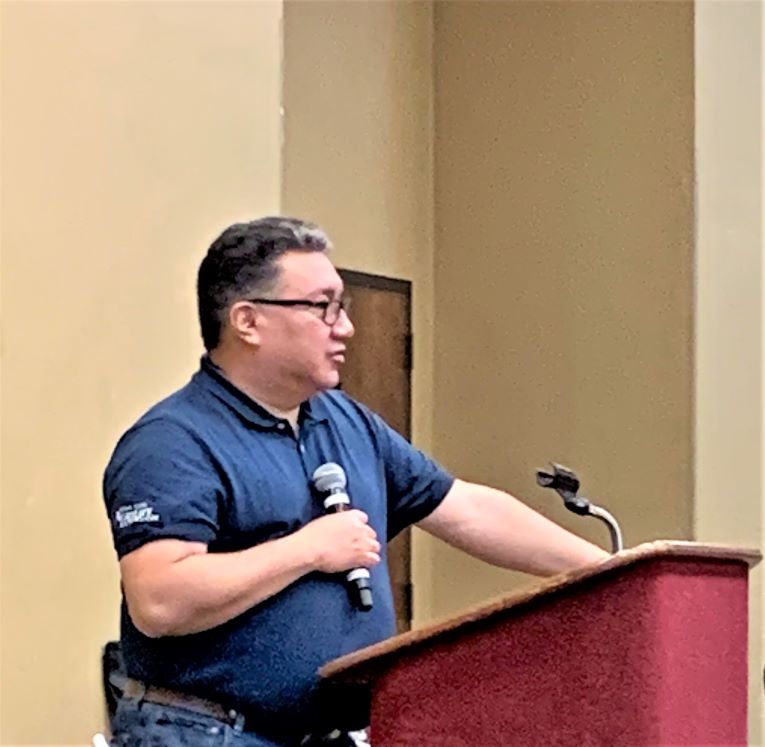
For more than twenty years, the North East Texas Beef Improvement Association (NETBIO) a group of independent cow/calf producers and agribusiness representatives work together to enhance the beef industry in Northeast Texas. NETBIO works in conjunction with the Texas A&M- Commerce and the AgriLife Office in Sulphur Springs. The goal of the organization is to establish a reputation for the area as a supplier of quality beef calves that will perform when they leave the cow. That includes utilizing quality sires and encouraging good management practices from weaning until the calf is ready for the NETBIO Pre-Conditioned Stocker and Feeder Calf Sale where producers can offer their pre-conditioned calves and yearlings in load lot quantities.
The Key Components of Preconditioning cattle include: Vaccination: Administering vaccines to protect against common diseases such as respiratory infections, clostridial diseases, and other pathogens. Nutrition: Ensuring calves have a balanced diet that supports growth and immune function. This may include creep feeding and providing mineral supplements. Weaning: Gradual separation from the cow to minimize stress. Methods such as fence-line weaning or two-stage weaning can be used. Parasite Control: Implementing a deworming program to manage internal and external parasites. Dehorning and Castration**: If not already done, these procedures should be performed early to minimize stress and promote healing. Identification: Proper identification using ear tags, brands, or tattoos to track health records and ownership. Health Monitoring**: Regular observation and health checks to quickly identify and treat any issues that arise during the preconditioning period. There are many benefits of preconditioning cattle, including Reduced Stress, because calves experience less stress during weaning, transportation, and entering feedlots. Improved Health: Lower incidence of respiratory and other diseases. Better Growth: Proper nutrition and health management support optimal weight gain. And Increased Market Value since preconditioned calves often command higher prices due to their improved health and performance.
The Texas A&M AgriLife Extension Service provides resources, workshops, and guidance for producers to implement effective preconditioning programs. This includes detailed protocols, health management schedules, and advice on nutrition and parasite control. For more specific information and resources, producers can contact the Hopkins County AgriLife Extension office or visit the Texas A&M AgriLife Extension Service website
Texas State Parks Pass Price to Increase Sept. 1
June 25, 2024
AUSTIN— The Texas State Parks Pass, which gives passholders and their guests unlimited free day-use access to all 88 Texas State Parks, is increasing its annual price from $70 to $95 on Sept. 1. This is only the second time the price has increased since the program was instituted in 2004.
“We hope people take advantage of the next few months by getting their annual Texas State Parks Pass before the price increases this fall,” said Jill Kreindler, Texas State Parks Marketing and Brand Manager. “Summer is the perfect time to explore new parks and possibly have new experiences with family and friends. If you’ve always thought about investing in a park pass, this is the perfect time to do it!”
There are special events at parks that happen only during the summer, added Kreindler.
“Some parks really pull out all of the stops and make an ideal space for summer fun,” said Kreindler. “Garner State Park hosts a dance every night through the summer from 8:30- 11 p.m. until mid- August. At Palo Duro Canyon State Park, the TEXAS Outdoor Musical runs Tuesdays through Sundays at the Pioneer Amphitheater at the park. The show tells the stories, struggles and triumphs of early settlers through song, dance, fireworks and lots of Texas humor!”
Texas State Parks benefits extend beyond the front gate, with a half-price discount for the second night of camping when visitors stay two or more consecutive nights in the same campsite or screened shelter. Passholders also get 10 percent off most retail and rental items and park stores, special discounts for activities and events and a subscription to the State Parks Getaways e-newsletter with seasonal activity ideas and highlights. Additionally, the shipping and handling fee previously in place for online and phone pass orders will no longer apply.
Current Texas State Parks Pass holders who have a pass expiring after Sept. 1 can renew early (up to 150 days prior to expiration) to get another 12 months of pass benefits at the $70 price.
The Youth Group Annual Pass (YGA), which allows free entry to state parks for nonprofit youth group members and a number of adult sponsors, will rise from $100 to $150. YGA applications received in August but paid on Sept. 1 or after will pay the new fee price. Email Youth Group Annual Pass with questions about application status.
Texas State Parks Passes can be purchased on our reservation website, in person at most state parks, or by phone at (512) 389-8900. For more information, visit our Frequently Asked Questions page.

An East Texas town wants to revolutionize how the state cares for people living with memory loss
By Jess Huff and Stephen Simpson, The Texas Tribune
June 19, 2024
QUITMAN — Addy Lois Dunn’s memory became a concern after she began running red lights and forgetting well-worn routes. She would soon be diagnosed with dementia, and her family, including her son, Randy Dunn, would rally to her care.
That was more than 20 years ago. Addy is now gone. She died in February 2012 at 74.
Yet, her battle inspired Randy, who is now the mayor of Quitman, a small East Texas town. And he is part of a group on a multi-year quest to establish a new kind of care for Texans living with dementia and Alzheimer’s.
The project — a 54-bed hospital based on a Scandinavian health care model that provides residents with more independence — is waiting for crucial support from the state Legislature.
The city has already won a $6 million grant from the federal government. However, they can’t cash that check until the state agrees to match funds. Mayor Dunn had hoped the Legislature would act during the 2023 session, which included a record surplus in the state budget. Lawmakers did not oblige.
That makes this time leading up to the 2025 legislative session critical to Dunn and his partners.
The Quitman group, which includes multiple members who have loved ones who died from memory loss diseases and health care professionals, see their work as putting Texas on the map for memory loss care.
“It’ll be a national model,” said Tom Mullins, a contractor for the University of Texas health system assisting with business development in East Texas.
A movement begins
Addy was lucky. She was able to stay home with her husband, Franklin, for the duration of her battle with dementia. And unlike many of the hundreds of thousands of Texans living with the disease, she had a village of friends to care for her, allowing her to roam freely on the family farm.
But it was still difficult for the family to care for her.
“For my mom, if we had had some of this training, it would have made it so much more pleasant for everyone,” Dunn said.
Addy’s situation is not the norm for Texans living with memory loss, Dunn said, a fact he learned after he was approached by other professionals in his town.
In 2020, Orval Lindsey, a member of the Wood County Hospital board, and Annette Simpkins, president of the Wood County Healthcare Foundation, met with Dunn and pitched him on the memory care idea. As mayor of Quitman, they said, he could take the project further by providing community support.
Options for memory care in East Texas — and across the U.S. — are limited by what families can afford. Even then, services may be limited to sedation and locked wards, as Lindsey learned when caring for his own family.
/https://static.texastribune.org/media/files/4785858773ece38755abbed0e30d8dcc/0314%20Quitman%20Health%20MC%20TT%2031.jpg)
But Lindsey had seen high-end private care villages, a Scandinavian concept, that have begun to spring up across the world. Lindsey and Simpkins, among several others, thought the village could be replicated — and made accessible for low-income families — in East Texas.
Early estimates suggested the project would cost at least $60 million — a steep figure for a community of 2,301.
Quitman is an unassuming little community and an unlikely place for such a facility.
It sits about an hour north of Tyler, the nearest metropolitan area. But it is energetic for a small town. Cars bustle to and from the small businesses that pepper the town’s two square miles and leaders see growth in its future as bigger businesses also establish themselves in the area.
About 10% of Quitman residents live below the poverty line, and 6% of residents over 65 live in poverty. The East Texas region had a 16% poverty rate between 2015 and 2019, according to the most recent economic overview of the region by the University of Texas in Tyler.
Early in the process, the group conducted a needs assessment of a 45-mile radius that looked at demographics like age, health, financial feasibility and more.
“As we moved through each step, we gathered more detailed information, and that gave us confidence that what we’re doing here is on the right track,” said Mullins, who Dunn said has been instrumental in pushing the project forward.
The federal government agreed and awarded Quitman a $6 million grant. However, the grant is contingent on matching state funds. And despite lobbying from the Quitman community and a record surplus, the state Legislature has yet to act.
/https://static.texastribune.org/media/files/47c6dd09e6a3444a374d35fcc5381c61/0314%20Quitman%20Health%20MC%20TT%2010.jpg)
Dunn and others worked with state Sen. Bryan Hughes, a Republican who was born in Quitman and represents parts of East Texas, to write legislation to match the federal grant. The bill never advanced during the budget process.
Hughes did not respond to an interview request from The Texas Tribune. Dunn said he believes Hughes and state Rep. Cole Hefner, R-Mount Pleasant, support the project.
“Both of them have met with us multiple times and agree there is a huge need for this project,” Dunn said.
The federal grant, which was championed by U.S. Rep. Lance Gooden, R-Terrell, is available through the 2025 session, Dunn said. That gives the Legislature one more chance to act.
“It is vital that leaders prepare the state for the growing need for research on the prevention and treatment of brain-related diseases,” AARP Texas State-Federal Strategy Director Kathy Green said. “By funding research within Texas, leaders can ensure that Texans reap the benefits of new technologies and treatments.”
Budding inspiration
The group found inspiration in European dementia villages established by Dr. John Zeisel, an internationally known expert on dementia care and treatment.
Zeisel’s interest in dementia care was first piqued in the 1990s and grew after visiting a quiet dementia care neighborhood in the Netherlands where patients were given the freedom to pursue daily routines in a peaceful and less restrictive environment. This, he thought, should be the standard for care.
“We have to shift from the predominant despair narrative around dementia, which says, ‘The minute you get a diagnosis, it’s downhill from here’,” Zeisel said.
Dementia and Alzheimer’s are often confused as the same illness. But they are different.
Dementia is a progressive neurological disorder that affects memory, thinking, and behavior and is typically caused by damage to brain cells. Dementia is also often used as an overarching term that refers to a range of symptoms that affect cognitive abilities.
Alzheimer’s disease is a specific type of dementia and the most common, characterized by progressive memory loss and cognitive decline.
Other types of dementia exist, each with its distinct causes and characteristics.
The progression of dementia due to Alzheimer’s is gradual and may take years to reach the point where around-the-clock medical care is needed. Many people with dementia can continue to operate with a modicum of freedom in the world with moderate help.
Zeisel conducted a two-day training session for the Quitman group, which led to the current vision. In concept, the Quitman facility will house 54 people who can spend their days working on a farm, tending animals or a garden, taking walks and generally living life.
“These folks are still living. We need to create an environment that will allow them to still do things. A lot of them are still mobile,” Dunn said.
Family members can visit regularly. And the facility will offer training to medical professionals and students alike, a key component that would provide ongoing funding for the facility. A likely partner will be the University of Texas at Tyler and its medical school.
/https://static.texastribune.org/media/files/4f7c44a9415fdce1eff020bb278abb5c/0314%20Quitman%20Health%20MC%20TT%2044.jpg)
The plan also includes training for family and friends who are primary caregivers for people living with memory loss.
“For my mom, if we had had some of this training, it would have made it so much more pleasant for everyone,” Dunn said. “She wasn’t a violent person but still it would allow her to do more.”
Is this possible?
Quitman would be the first of its kind established in the U.S., Ziesel said.
Carmen Tilton, vice president of public policy at the Texas Assisted Living Association, is skeptical the care facility would lead to a dramatic shift in care. Even if the facility opens, Tilton said, the level of care would likely be difficult to replicate across the state due to the cost.
Community collaborative projects like the one in Quitman are phenomenal ideas, but most regions cannot replicate them as they require a certain level of buy-in and broad support, Tilton said.
“Every part of the ecosystem needs to be on the same page for something like this to work. And even when you do have it, it can be tough to sustain,” Tilton said.
Dementia villages won’t take off in Texas until there is a fundamental shift in how Medicare and Medicaid provide residential services, Tilton said. Medicare doesn’t cover assisted living services at all. Medicaid does, but only at a rate of $40 a day. That rate is expected to cover meals, housing, health care, support services, housekeeping and activities.
The cost of memory care varies depending on where someone lives in Texas. Families can expect to pay around $4,000 to $6,000 per month. The national average monthly cost for memory care facilities is around $7,500.
The group hopes to pay for it by partnerships with educational institutions, foundations and government grants.
Other dementia-type villages around the country have switched to only provide daytime residential facilities due to staffing shortages, limiting the effectiveness of these facilities.
This gulf between how state programs value holistic or residential care services like a dementia village seems to be an insurmountable hurdle in making this an option for all Texans and the country.
“Access to that kind of environment is going to be really, really limited to just those who have the very highest incomes,” Tilton said. “And we can’t make a system that only works for people in the absolute top income bracket.”
/https://static.texastribune.org/media/files/1854a8b93931b600c3ecf865ba2fce9b/0314%20Quitman%20Health%20MC%20TT%2029.jpg)
The Quitman team will continue to push for other forms of funding through grants, regional buy-in and fundraising.
“This town could be a community, an Alzheimer’s friendly community, where the restaurants and everybody in town would understand how Alzheimer’s works and be more accepting to them,” said Debbie Robinson, vice president of the Wood County Healthcare Foundation. “They would have a place, and not just be a person with Alzheimer’s locked in a closed hallway.”
Disclosure: AARP and AARP Texas have been financial supporters of The Texas Tribune, a nonprofit, nonpartisan news organization that is funded in part by donations from members, foundations and corporate sponsors. Financial supporters play no role in the Tribune’s journalism. Find a complete list of them here.
This article originally appeared in The Texas Tribune at https://www.texastribune.org/2024/06/19/quitman-texas-memory-loss-care-center-alzehimers-dementia/.
Multiple Arrests for Organized Crime Connected to Local Stolen Vehicles

June 24, 2024 – The stolen vehicles case continues to unfold with more charges being levied against an expanding circle of suspects. Richard “Richie Rich” Lopez has been arrested on two counts of Engaging in Organized Criminal Activity. Lopez’s bond has been set at $300,000 on the two charges. Chelsea Clark was arrested and charged with two counts of Engaging in Organized Criminal Activity as well and has been released from custody.

It would seem that investigators have a full time job unraveling a string of crimes as more information comes to light. It all started more than five and half months ago, as suspected stolen vehicles were located at a residence in Sulphur Springs owned by local resident Everett Jennings. That investigation resulted in a local wrecker service being dispatched to secure several of the high value vehicles. By February, more investigations led to more charges with Jennings eluding authorities as deputies attempted to serve a warrant, which resulted in the arrests of two of Jennings’ family members for hindering apprehension of a known felon. Before the end of March, Jennings was again tracked down returning from a pleasure cruise at the Port of Galveston, allegedly tampering with a tracking device he had been fitted with earlier. Less than two weeks later, a stolen boat was recovered in Yantis with potential links to Jennings. As Everett Jennings has remained in jail, more charges have been piling up on his arrest report, including two charges of Engaging in Organized Criminal Activity. Now two other suspects, Lopez and Clark, have also been charged with two counts of Engaging in Organized Criminal Activity Jennings’ current bond amount is set at $600,000 (down from $2,250,000).
If you have an emergency, dial 9-1-1
The Hopkins County Sheriff’s Office is located at 298 Rosemont Sulphur Springs, TX 75482. You can reach them for non-emergency matters at (903) 438-4040.
TAMUC Student Captures Team Roping Championship at College National Finals Rodeo
June 24, 2024 – TAMUC’s Profili Captures Team Roping Championship at College National Finals Rodeo
The title is the third individual National Championship for A&M-Commerce Rodeo in the last three years
COMMERCE, TX, June 24, 2024—Texas A&M University-Commerce Rodeo Team member Kaden Profili highlighted the Lions’ success at the 2024 College National Finals Rodeo (CNFR) with a National Championship victory in the Team Roping event.
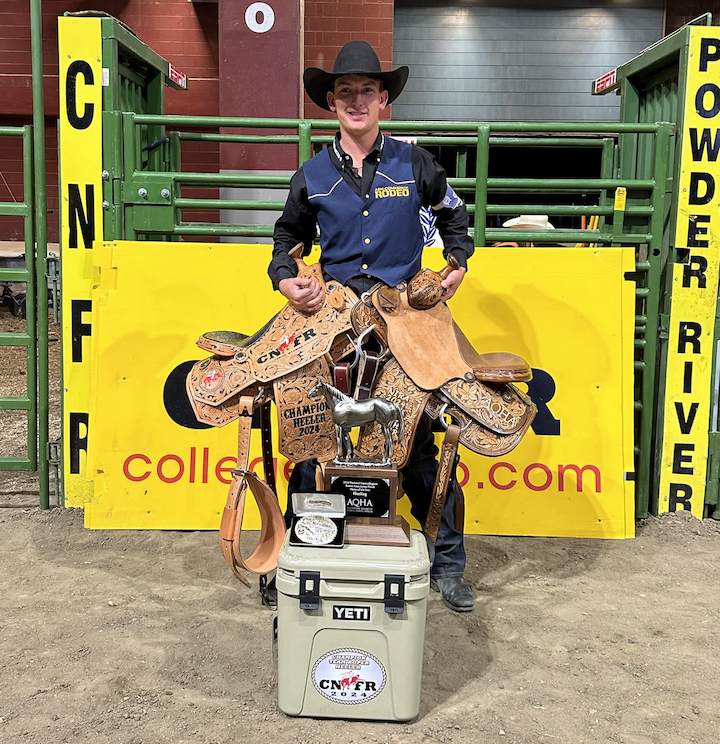
Profili, a senior majoring in agricultural science and technology from Jacksonville, Texas, won the event as the team’s heeler. He was paired with James Arviso of Hill College. This was Profili’s fourth trip to the CNFR and his first national title, with his previous best finish being 12th.
In Team Roping, two cowboys – a “header” and “heeler” – work together to successfully rope a steer in the fastest time possible. The header must secure his rope around either the horns, head or neck, while the heeler must successfully rope both hind legs. The clock stops once there is no slack in the ropes and both horses face each other.
Profili and Arviso finished with a cumulative time of 31.6 seconds across four rounds, and the team’s second round time of 4.1 seconds is one of the fastest in CNFR history. Profili’s horse, Gunna Be an Angel or “Grace,” was also named the Overall Men’s Horse of the Year and Horse of the Year in the Team Roping event by the American Quarter Horse Association.
This victory made 2024 the third consecutive year that an A&M-Commerce rodeo student-athlete was crowned a National Champion at CNFR. In 2023, Kincade Henry captured the title in the Tiedown Roping event, while Bryana Lehrmann was champion in Breakaway Roping and was the Women’s All-Around champion in 2022. In addition, this was the second year in a row that an A&M-Commerce rodeo team member’s steed took the title of the Men’s Horse of the Year, after Cutter Carpenter’s horse “Twix” received the honors in 2023.
Also competing in this year’s event were A&M-Commerce students Addie Weil and Rylee George, both in the Breakaway Roping event.
Weil, a sophomore from Edna, Kan., currently double majoring in animal science and biological sciences, finished 25th in the event in her second CNFR appearance. George, a graduate student from Oakdale, Calif., majoring in agricultural sciences, finished 37th in her fourth time at the CNFR.
A&M-Commerce Rodeo Head Coach Dameon White had high praise for the Lions’ performances at CNFR.
“Kaden’s performance speaks volumes to how he handles the pressure of competitive rodeo. He consistently roped great the whole year and just kept it going at the CNFR,” White said. “Rylee and Addie roped great all year long and continued to do quite well over the weekend. These girls made the best of their rodeo given the calves they drew.”
Learn more about Rodeo at A&M-Commerce.
Enhanced DWI enforcement on Texas roads ahead of July 4
June 24, 2024 – Law Enforcement agencies across Texas are stepping-up their efforts to catch drunk drivers as Independence Day nears with all of its celebrations that often include alcohol.
State troopers, sheriff’s deputies, local police officers, and other lawmen began their enhanced DWI enforcement on Friday, and it will remain in place until July 7.
At the same time, the Texas Department of Transportation is rolling out its Drive Sober, No Regrets campaign ahead of July and August, the two months that TxDOT says are the deadliest when it comes to drunk driving.
The awareness campaign includes testimonials from the families of victims of drunk driving crashes including Shenica Trammell from San Antonio.
A drunk driver hit her 20 year old son Charles Trammell III as he changed a tire on a friend’s car in the Dallas area in August of 2022.
The impact sent the Texas Wesleyan University football player flying 60 feet off of an overpass to his death.
“He didn’t get a chance to live out his dreams of becoming a football coach and working in sports medicine,” Trammell said. “He didn’t have a chance to have kids or even get married all because someone made a thoughtless choice to drink and drive.”
TxDOT is featuring her family’s story in its Faces of Drunk Driving exhibit that’s part of the Drive Sober, No Regrets campaign.
The agency says the exhibit is, “traveling across Texas to showcase powerful first-person testimonial videos by survivors, offenders and those who’ve suffered the loss of a loved one due to a drunk driver.”

Texas Power Grid Energy Sources Monday
June 24, 2024 – Here is a snapshot (10:30 AM) of the energy sources powering the Texas Power Grid today. Fossil fuel use is ahead of Solar and Wind.
A heat dome is a high-pressure system that, because physics, traps heat and keeps it there. That pressure system’s atmospheric energy is hard to bust up: The high pressure above is met with the rising heat below, which makes the system especially stubborn and slow-moving. A heat dome often suppress wind during the summer months, and make wind power generation difficult.

Majority of Texans Say an Electrical Grid Failure Could Come This Summer
Nearly three years after Winter Storm Uri, Texans have little faith that the state’s electrical grid can weather the coming summer months.
Luca Cacciatore | June 21, 2024
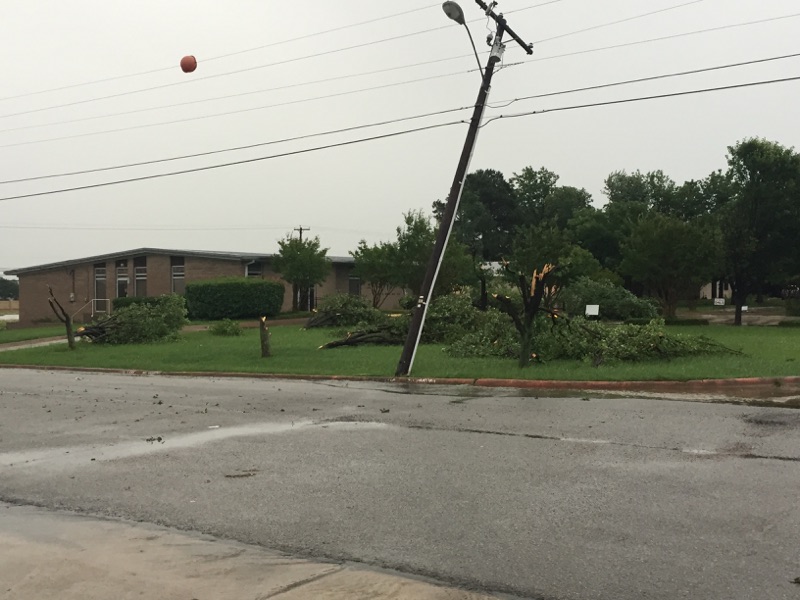
A new poll from the University of Texas at Austin’s Texas Politics Project found that a majority of Texans believe an electrical grid failure could occur this summer.
Conducted between May 31 and June 9, the poll showed that 17 percent of Texans think a grid failure this summer is likely, with 34 percent saying it is somewhat likely. Another 29 percent of respondents said it was not too likely, nine percent said not at all, and 10 percent were unsure.
The results come roughly three years after Winter Storm Uri rocked Texas, causing power outages across the state. During the peak of the crisis, at least 4.5 million residents were left without electricity.
Now, some lawmakers, trade groups, and industry giants are sounding the alarm over the Electric Reliability Council of Texas, an organization that operates Texas’ unique independent electrical grid covering most, but not all, of the state.
During a June 10 hearing in the Texas House, Association of Electric Companies of Texas President and CEO Mark Bell defended ERCOT’s preparedness heading into this summer season but warned about future stressors.
“Already, we have seen a tremendous amount of storm activity, causing outages in every corner of our state,” explained Bell, “and we’re due for the most active Atlantic hurricane season that the NOAA [National Oceanic and Atmospheric Administration] has ever predicted, with as many as 25 named storms and 13 hurricanes.
“Data centers in the DFW [Dallas-Fort Worth] area; semiconductors in Central Texas; industrial electrification in the Houston, Beaumont, and Port Arthur areas; oil and gas electrification in the Permian [Basin]; and population and commercial growth throughout our state present significant challenges for generation, transmission, and distribution,” he added.
The accompanying legislative debate primarily centers on how Texas can strengthen the grid and whether Texas should incorporate its independent electrical grid with the rest of the United States.
On one side is U.S. Rep. Greg Casar, a Democrat from Congressional District 35, who has proposed federal legislation to nationalize the grid. State Sen. Bob Hall (R-Edgewood), meanwhile, has vocally opposed nationalizing the grid and has instead suggested other methods of ensuring its reliability and security.
On Wednesday, Energy Alliance Policy Director Bill Peacock penned a commentary where he attributed some of the state’s growing grid concerns to the costs of unreliable energy sources.
“Since 2014, the reliability of the Texas grid has collapsed as federal, state, and local subsidies for renewables averaged $2 billion a year,” wrote Peacock. “Over the next five years, subsidies for traditional and renewable subsidies are expected to average at least $6.4 billion.”
Securing the grid is a top Republican Party of Texas priority for the upcoming legislative session.
An overview of the priority specifically states the state should seek to ensure “the integrity of Texas electricity production and delivery of abundant, reliable, and resilient energy,” as well as ensure that “the Texas grid can withstand any natural or manmade threat to include weather, cyber, physical, electromagnetic pulse (EMP) and geomagnetic disturbances (GMD).”
This article originally published here.




